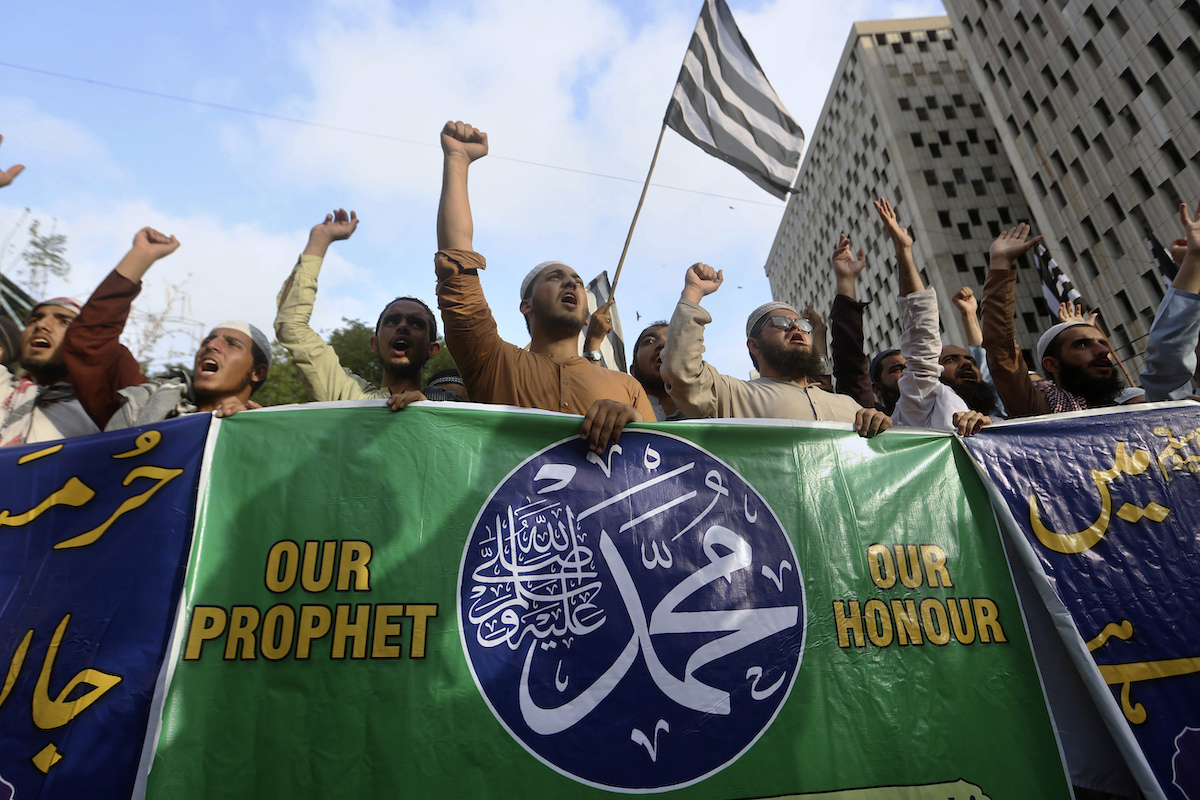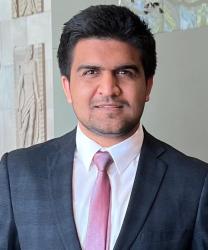Blasphemy laws pose a real challenge to religious liberty and democracy in several Muslim-majority countries, with 32 nations criminalizing blasphemy; in Iran, Pakistan, Afghanistan, Brunei, Mauritania, and Saudi Arabia, it is punishable by death. In Pakistan alone, according to the National Commission for Justice and Peace, 776 Muslims, 505 Ahmadis, 229 Christians, and 30 Hindus were accused of blasphemy from 1987 to 2018. Even though Christians, Ahmadis, and Hindus comprise less than 4% of Pakistan’s total population, they account for more than 50% of all blasphemy accusations. Former Prime Minister Imran Khan was recently accused of blasphemy by the sitting government. In addition, more than 77 Pakistanis, including a Sri Lankan citizen, have been killed in extrajudicial lynchings in connection with blasphemy since 1990.
In light of this history, supporters of free speech and religious pluralism have demanded that the Pakistani government abolish its blasphemy laws and “modernize” by joining hands with the free world. I do not challenge or dispute the basic demand that blasphemy laws be repealed, because God, the Merciful (ar-Rahman) and the Compassionate (ar-Rahim), has no enemies and, as KH. Abdurrahman Wahid notes, needs no defense. However, I must stress that the issue of blasphemy has to be understood from a wider political and sociological perspective in order for reforms in religiously conservative societies like Pakistan to be successful. The oversimplified focus on the legal dimensions of blasphemy when not a single person has been judicially executed for it in the country—but dozens have been mobbed and lynched—is misguided. Overly state-centric and legalistic approaches will only prove problematic, misleading, and, I believe, ineffective.
The West has made repeated entreaties to Muslim-majority countries to abolish their blasphemy laws, with the U.S. Commission on International Religious Freedom (USCIRF) imploring Pakistan in particular to repeal such laws and “release blasphemy prisoners.” Amnesty International urged the Pakistani government to repeal blasphemy laws “without delay” and to “establish a moratorium on all executions and commute all death sentences that have already been imposed.” Some commentators, on the other hand, believe that while repealing blasphemy laws is unrealistic, the Pakistani parliament nevertheless ought to amend certain sections of the law in order to limit its scope to the “direct and unambiguous expressions of blasphemy.” In my opinion, the exclusive demand of abolishing all blasphemy laws is not only ineffective but also dangerous, in that it empowers Islamists who use such policy directions and scholarship to convince their followers of the existence of a Western conspiracy against Islam and Islamic values and culture
It is important to appropriately understand the genesis of blasphemy laws before attempting to either abolish or replace them with legal provisions to promote religious freedom. There are two leading theories about the emergence of blasphemy laws: First, that the 13th-century French king Louis IX is responsible for the making of the first formal blasphemy laws, and that later British colonialists brought these laws to South Asia in the 19th century. Zia-ul-Haq—who ruled Pakistan from 1978 to 1988 and used the state as an organizational weapon to enforce his extremist ideology—expanded the scope of the laws and made them more stringent by adding provisions like 298-A, which criminalized the use of “derogatory remarks, etc., in respect of holy personages” (the same legal provision used to target the Shia minority).
Alternatively, Ahmet T. Kuru, author of Islam, Authoritarianism, and Underdevelopment: A Global and Historical Comparison, proposes the theory that blasphemy laws have roots in early Islamic history. According to his theory of ulema-state alliance (the nexus between the political and religious classes), during the mid-11th century some Sunni scholars worked closely with the political rulers to challenge the “sacrilegious influence” of philosophers on society. Kuru argues that the ulema-state alliance emerged in what is today’s Central Asia, Iran, and Iraq, and spread to Syria, Palestine, and Egypt under the Ayyubids and later the Mamluks during the 12th and 14th centuries. It caused “a multilevel transformation” in the Muslim world and led to the rise of Sunni orthodoxy, which continues to dominate the cultural imagination and intellectual discourses.
I agree with both arguments. The ulema-state alliance, British colonialism, and Zia-ul-Haq all contributed to the creation and institutionalization of blasphemy laws in Pakistan; further, American foreign policy is also responsible for the development of a pro-blasphemy cultural and legal discourse. In their 2002 article in the Washington Post, “From America, the ABC’s of Jihad,” Joe Stephens and David B. Ottaway discuss how Ronald Reagan’s administration spent millions on the printing of textbooks (in Pashto, Dari, and Urdu) “filled with violent images and militant teachings, as part of covert attempts to spur resistance to the Soviet occupation.” Pakistan received these books alongside “aid” to ensure the sustainability of “Jihad” in Afghanistan. Such an environment was conducive to the pursuit of Zia’s ideological agenda of Islamizing the society.
Following early Islamic scholarship—produced as a result of the ulema-state alliance—and Zia’s Islamization project, there has emerged a new religio-political party in Pakistan that solely defends blasphemy laws and the murderers of alleged blasphemers. The emergence of this radical group has further complicated the debate surrounding the state’s role to “protect and defend” Islam.
In 2011, Salman Taseer, the former governor of Punjab Province, was killed by his security guard, Malik Mumtaz Qadri, for his campaign to repeal the blasphemy law. Taseer’s killer was executed in 2016, and quite unsurprisingly more than 100,000 people attended Qadri’s funeral at Liaqat National Bagh in Rawalpindi. Additionally, the family received approximately 80 million rupees (approx. $380,000) in donations on the first day after Qadri’s death, and a few months later the Mumtaz Qadri Shaheed [Martyr] Foundation was established to construct a shrine for Qadri’s devotees on the outskirts of Islamabad.
Qadri as the murderer of Taseer helped Khadim Rizvi, an imam masjid (prayer leader), to run a campaign titled Save-Qadri. After Qadari’s hanging in 2016, Rizvi launched Tehreek-e-Labbaik Pakistan (TLP) with the slogan “Labaik Ya Rasool Allah” (I am here, O Prophet). TLP’s emphasis on the idea of the finality of the Prophet Muhammad (Khatm-i-Nabuwwat) and slogans like “deen ko takht par laana hai” (we will bring religion into power) and “vote ki izat nizam-e-Mustafa mein ha” (honor of vote is in Prophet Muhammad’s system) helped Rizvi secure the support of a large number of lawyers, retired judges, public servants, pirs, and sajjada nasheens (custodians of shrines).
In the 2018 election, TLP received 2.2 million votes and won two seats in the Sindh Assembly; in Punjab, Pakistan’s largest province, the party bagged approximately 5.7% of the polled votes for the National Assembly and emerged as the largest single religious party since 2002.
From the large number of people attending Mumtaz Qadri’s funeral to the growing electoral base of the TLP, it is clear that the role of blasphemy laws is not simply a legal question—nor has it ever been one. At this moment, any attempt to repeal such laws will only exacerbate the violence. Islamists are already encouraged by the state authorities and public intellectuals to refrain from taking the law into their own hands by killing alleged blasphemers, as there is an established law to punish them; however, lynchings continue because of the prevailing perception of the state’s lethargy or disinterest in punishing those who (supposedly) insult Islam or its prophet. Islamists want the state to be tougher on the blasphemers by executing those facing blasphemy charges. In such an environment, talking about repealing certain legal provisions—or even suspending the enforcement of such laws—can be counterproductive at best and a cause of more violence at worst.
The West’s belief that an end to blasphemy laws would lead to an end to extremism and violence is based upon a half-baked understanding of Muslim societies like Pakistan. To dispel such a long-held view, it is important to understand that killing in the name of blasphemy is not a challenge for Muslim-majority countries only, as recent cases in France and India reveal. Further, it has to be understood that blasphemy laws are the result of a complex theology and authoritative politics. Abolishing such laws in response to international pressure will do little good to the societies facing a new wave of Islamic extremism, especially as public opinion in Muslim-majority countries—at least in Pakistan—is in favor of these laws. Any attempt to abolish such laws that have such vital social support will create or intensify existing anti-West sentiment and the belief that the U.S.-led world is intent on spreading and imposing a fabricated interpretation of Islam.
The fight against blasphemy laws has to be a part of the larger struggle for democracy and liberty in the Muslim world. Necessary social changes will become possible only when the West understands that the real challenge is not blasphemy laws but a particular interpretation of Islam that has engulfed the cultural discourse in the Muslim world and has the potential to endanger freedom elsewhere. To help the Muslim world become tolerant and free, and to protect liberty at home, the West has to focus on building strong and principled civil societies in countries like Pakistan. However, it should be noted that civil society is likely to remain ineffective at bringing any meaningful social change if there are no independent institutions of higher education focused on the ideals of liberty and religious pluralism.
Therefore, the long-term Western project has to be about education and clearly defined objectives to reform the public discourse. In the eyes of many Pakistanis, Western-funded NGOs have lost their credibility; investing in higher education with the help of civilian government(s) is what both Pakistan and the West must focus on instead. In doing so, the West should not demand that Pakistan abolish blasphemy laws outright; rather, it must prepare a new generation of young intellectuals to build a strong civil society that will organically bring an end to its own blasphemy laws. A ground-up demand that such laws be abolished will have the necessary social support needed and will not create a vacuum to be filled and exploited by the Islamists.
Finally, until we achieve the ultimate objective of abolishing blasphemy laws through an organic demand spurred on by civil society, there have to be certain measures in place to protect those accused of blasphemy. I tend to partially agree with what Ahmet Kuru, Robert Hefner, and Jeremy Barker have recommended to Muslim governments in their report “The Intersection of Blasphemy Laws & Institutional Religious Freedom: Egypt, Indonesia, Pakistan, and Turkey” for the Religious Freedom Institute, especially their suggestion of an “administrative approach” that avoids passing new blasphemy laws. The government of Pakistan must stop making more laws while working in collaboration with civil society and the West on the long-term goal of ensuring that the social prerequisites are in place for equal citizenship, individual and institutional religious freedom, and undisrupted democracy. No matter how unfortunate the current situation is, the existence of blasphemy laws today, at least in Pakistan, acts as a shield to protect accused persons from the wrath of the mob. Any changes made in haste will have far-reaching, unintentional, and unfortunate consequences.

